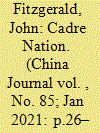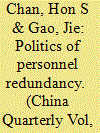| Srl | Item |
| 1 |
ID:
177961


|
|
|
|
|
| Summary/Abstract |
In recent years China’s Communist Party leadership has drawn attention to the lessons of imperial history for China’s modern system of cadre (ganbu) management. The Party’s focus on history draws attention to points of continuity and discontinuity between the bureaucratic systems of the empire and the People’s Republic. This article considers the historical framework of territorial government under which officials operate and the historical trajectory of bureaucratic control over territorially based communities over the longue durée, from the imperial period through the early Republic and into the People’s Republic under Xi Jinping. By approaching the Communist Party’s cadre system as a historical outgrowth of an earlier system of territorial administration, this article brings to light assumptions dating from the late imperial period that continue to underpin the exclusive power and privileges attached to the position of officials in China, which create, in effect, a nation of cadres.
|
|
|
|
|
|
|
|
|
|
|
|
|
|
|
|
| 2 |
ID:
181917


|
|
|
|
|
| Summary/Abstract |
The cadre system in China is designed to reduce human error as well as improve government efficiency and competence. Focusing on the Tibetan Autonomous Region (TAR), this research analyses the particularities of the cadre system in China’s ethnic minority regions and their impact on local governance. It argues that peculiarities in the recruitment, evaluation, term of office and ethnic minority cadre arrangements have actively and passively encouraged controversial cadre behaviours at the local level. Together with the historical, political and demographic conditions in the TAR, the cadre system has, at times, decreased the efficiency, competence and credibility of local governments. Although changes have been introduced in recent years to address some of the issues, the cadre system’s impact on local governance remains fundamental.
|
|
|
|
|
|
|
|
|
|
|
|
|
|
|
|
| 3 |
ID:
161059


|
|
|
|
|
| Summary/Abstract |
This study provides an overview of the origin, importance and strength of the non-leading cadre system and argues that the system plays a key role in building resilience in China's bureaucracy. The non-leading cadre system is administratively and politically important because it makes the party-state bureaucracy more adaptable and fosters cohesion among the elite cadre workforce. Although the system may appear to have institutionalized redundancy, this study argues that this redundancy has the benefit of making movement between leading and non-leading cadre status possible. In other words, the non-leading cadre system provides the various levels of the party-state bureaucracy with the leverage to develop their own measures for resolving their own problems. Putting aside the deficiencies in implementation, the non-leading cadre system is likely to remain durable and will help to develop an agile and resilient personnel management system, at least in the short to medium term.
|
|
|
|
|
|
|
|
|
|
|
|
|
|
|
|